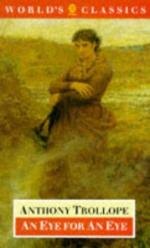“She is a mischief-making gossiping old maid,” said Neville angrily.
“Will you tell me that there is no truth in what she writes?” asked Lady Scroope. But this was a question which Fred Neville was not prepared to answer, and he sat silent. “Fred, tell me the truth. Are you married?”
“No;—I am not married.”
“I know that you will not condescend to an untruth.”
“If so, my word must be sufficient.”
But it was not sufficient. She longed to extract from him some repeated and prolonged assurance which might bring satisfaction to her own mind. “I am glad, at any rate, to hear that there is no truth in that suspicion.” To this he would not condescend to reply, but sat glowering at her as though in wrath that any question should be asked him about his private concerns. “You must feel, Fred, for your uncle in such a matter. You must know how important this is to him. You have heard what he has already suffered; and you must know too that he has endeavoured to be very good to you.”
“I do know that he has,—been very good to me.”
“Perhaps you are angry with me for interfering.” He would not deny that he was angry. “I should not do so were it not that your uncle is ill and suffering.”
“You have asked me a question and I have answered it. I do not know what more you want of me.”
“Will you say that there is no truth in all this that Lady Mary says?”
“Lady Mary is an impertinent old maid.”
“If you were in your uncle’s place, and if you had an heir as to whose character in the world you were anxious, you would not think anyone impertinent who endeavoured for the sake of friendship to save your name and family from a disreputable connexion.”
“I have made no disreputable connexion. I will not allow the word disreputable to be used in regard to any of my friends.”
“You do know people of the name of O’Hara?”
“Of course I do.”
“And there is a—young lady?”
“I may know a dozen young ladies as to whom I shall not choose to consult Lady Mary Quin.”
“You understand what I mean, Fred. Of course I do not wish to ask you anything about your general acquaintances. No doubt you meet many girls whom you admire, and I should be very foolish were I to make inquiries of you or of anybody else concerning them. I am the last person to be so injudicious. If you will tell me that there is not and never shall be any question of marriage between you and Miss O’Hara, I will not say another word.”
“I will not pledge myself to anything for the future.”
“You told your uncle you would never make a marriage that should be disgraceful to the position which you will be called upon to fill.”
“Nor will I.”
“But would not this marriage be disgraceful, even were the young lady ever so estimable? How are the old families of the country to be kept up, and the old blood maintained if young men, such as you are, will not remember something of all that is due to the name which they bear.”




